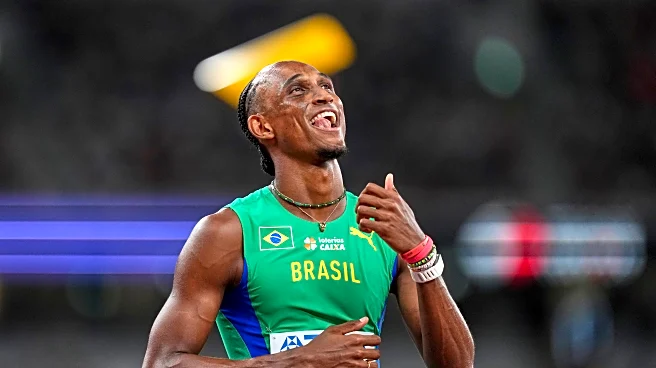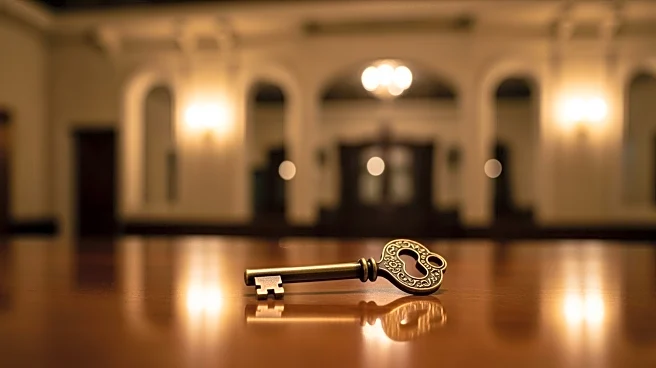TOKYO (AP) — When the pan of scalding oil tipped and splattered across 10-month-old Alison dos Santos, his grandfather scooped him up, barged through the front door and sprinted to the hospital – a burst
of speed and quick thinking that played a key role in saving the baby’s life.
The scars on his face, forehead, chest and arms from those third-degree burns are the permanent memories of a day 24 years ago that the Brazilian hurdles champion doesn’t remember, but one he can never forget.
When dos Santos lines up this week at world championships in the 400-meter hurdles -- maybe the single most stacked event over the nine days of racing in Tokyo -- he’ll be going against Olympic champions, world-record holders and world champions such as himself.
These are the sort of challenges he embraces from a sport he says gave him new life as a teen, when he was vulnerable and insecure about the scars that, until then, felt like they ruled his life.
“It was the environment, the friendship, the love they were able to give to me that helped me get through this,” dos Santos explained in a recent interview with Ready, Set, Go podcast, speaking of the track and field community near his hometown of São Joaquim da Barra that embraced him. “I was in need of some support, but I was never able to ask for it. And they were able to give it without me asking for it.”
Dos Santos grew up with the scars and the story, and said he often wondered, “Am I different? Can I fix this? What can I do to solve this problem?”
Adolescence and his teenage years made things worse. Even his friends would sometimes end arguments with some cutdown about the scars “because they knew it would hurt me.”
“They’re just saying what they see. They’re not understanding what that could mean to someone,” he said in another recent interview with international media. “I had to go through some dark times. But I had to understand that I wouldn’t be myself if I didn’t have the burns.”
His track friends saw him another way. Not the guy with the scars, but nice guy with a good sense of humor, an interest in others, and someone who could really run. That helped dos Santos create a different kind of life.
That life now involves traveling the world, scooping up medals and playing a main role in one of the best and most durable dramas going in his sport.
The 400-meter hurdles are a science of sorts, defined at first by Edwin Moses, who used his math smarts to chart the quickest way across 10 hurdles on a grueling lap around the track.
More than 40 years later, with the help of better training and, in a very big way, better shoes that act like mini-trampolines, dos Santos and his rivals are putting up numbers that felt impossible a generation ago.
And unlike when Moses reigned – he won 122 straight races from 1977 through 1987 – dos Santos, Karsten Warholm and Rai Benjamin are sharing time in the winner’s circle.
Benjamin is the reigning Olympic champion after his win last year in Paris, while Warholm won the world championship in Budapest in 2023. He took the title from dos Santos, who had won the year before at worlds in Eugene, Oregon.
Now, they return to the site of one of the most epic races of them all – at the Tokyo Olympics in 2021.
It was there that Warholm ran 45.94, bettering his own mark by .76 barely a month after he broke a record that had stood for nearly 19 years. Benjamin placed second with what would have been a world-record time had he won. Dos Santos finished third in a time that would have been a world record had he run it six weeks earlier.
When asked what about the science of hurdles has most contributed to making everyone better, dos Santos doesn’t list a technological feat, but rather, another hurdler — Abderrahman Samba.
When Samba of Qatar ran 46.98 in June 2018, he became the first hurdler to crack 47 seconds since Kevin Young set the world record in 1992.
Now, Samba’s time is tied for a distant 36th best ever. Of the 35 faster times, all but one – Young’s – were posted by Warholm, Benjamin or dos Santos.
“The first time Samba broke 47, I think he switched something for everybody,” dos Santos said. “When you see someone doing it 20 years ago you say ‘OK, that was 20 years ago, nobody’s doing that now.’ But when you see Samba doing that, you think ‘I’ve got to train harder.’ You’re no longer dreaming about low-48 and thinking you might get a medal.”
Samba is still very much in the game – ranked fourth, behind the three men who have swept the medals at the last two Olympics.
Just as Samba inspired him, dos Santos said he hopes his story serves as an inspiration for someone else out there. He sees the obvious connection between the hurdles he tries to clear everyday and the much more meaningful obstacles that competing in track helped him overcome as a child.
“I think I’m able to share with a bunch of people in the world, and especially Brazilians, that everyone is unique, everyone’s special in their own way," dos Santos said. "And you can achieve great things no matter how hard things are in your life. You can work on it and try to get better.”
___
AP sports: https://apnews.com/sports









